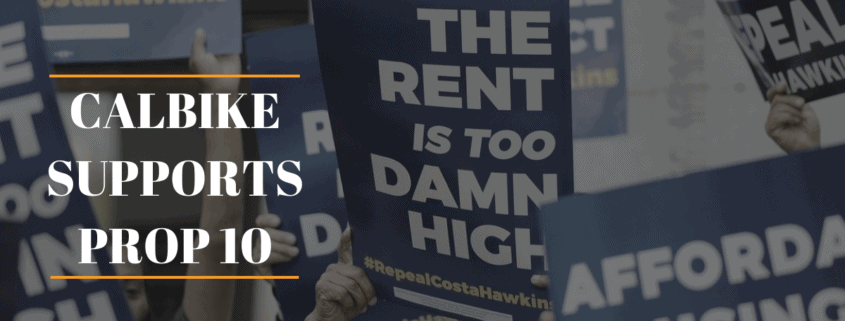Yes on Prop 10
CalBike Statement in Support of Proposition 10
Our transportation and housing policies are closely intertwined; we cannot change one without the other.
Affordable housing is absolutely essential to create and maintain equitable, inclusive, and prosperous communities. At CalBike, we advocate exactly for that, primarily by changing state transportation policy to enable residents to avail themselves of the healthful, joyful, and extremely affordable choice of bicycling for transportation. But we don’t advocate for bicycling in isolation.
Transportation costs are second only to housing costs when considering top household expenses. In virtually every real estate market, a major determinant of housing costs is accessibility. If your rent is low, but you have to spend a disproportionately large share of your income on transportation, then your living situation isn’t affordable. Without truly affordable housing accessible in every community, we will fall flat in our efforts to enable all of California’s communities to be equitable, inclusive, prosperous, and full of bicycles.
Housing affordability has reached a crisis point in California. The state has the highest poverty rate in the country due, in part, to the high cost of housing, with one-third of renter households paying over 50% of their income on rent. A leading reason for rising costs is the failure to protect low-income and marginalized residents from displacement when neighborhoods gentrify. There is strong evidence that transportation infrastructure improvements, including bike lanes, contribute to and exacerbate displacement of low-income residents of color. As we advocate for safer and more accessible transportation infrastructure, we need to help ensure that existing, current, and future residents, of all means, are able to utilize infrastructure improvements instead of being pushed out as improvements come. Protecting the most marginalized residents in California’s communities, through protecting and creating affordable housing for lower-income Californians, is a part of determining who infrastructure improvements truly serve.
Unfortunately, a 1995 state law severely limits the authority of local governments to control rents and protect affordable rental housing. Without changes to state law, new bike lanes and other public investment in communities too often means displacement of existing residents, usually low-income people of color. That might make a place more prosperous, but not more equitable and inclusive, and that’s contrary to our mission. Our mission is to advocate for equitable community transformations that benefit and include everyone, especially the low-income communities and communities of color who live in high transit areas which are most likely to receive walking and biking infrastructure, and are therefore at risk for displacement of existing residents and the loss of cultural resources that already exist in these neighborhoods. Our transportation justice goals work to ensure that our state utilizes smart growth and urban revitalization as tools to actively address the negative human and environmental impacts of the affordable housing crisis in California, and never to mask, ignore, or deepen current inequities.





